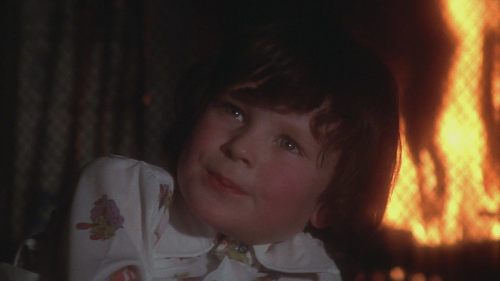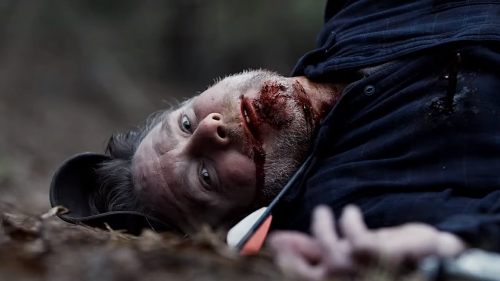Twelve Movies To Help You Prepare For The Trumpocalypse
Sorry to be the bearer of bad news, but Donald Trump is headed to the White House, and things are going to start changing around here. Luckily, a lot of filmmakers foresaw this sort of thing, and we’ve been blessed with a ton of movies that can help us prepare for what’s probably to come. We’ve compiled a list of just some of them.

Harry Potter and the Order of the Phoenix
For many millennials, the Potter series was the go-to comparison in the wake of the election, be it for its broader themes of hope and bravery, or its on-the-nose (and somewhat misapplied) parallel between Trump and the noseless Voldemort. And while it’s easy to dismiss such comparisons as drivel, there’s likely something to be gained from the series’ fifth installment. Trump isn’t nearly charismatic enough to be Voldemort, and if we’re being honest, he’s not an evil murderer either, just a narcissist who craves the spotlight. If anything, Putin is Voldemort and Trump is his Ministry/Hogwarts plant Dolores Umbridge, but comparison for comparison’s sake is pointless. Even if we go ahead with this parallel, what we extrapolate from it needs to be more than simply “this person is bad, so is this other person!” and Umbridge is a good place to start. Not just because she’s a dishonest leader with a penchant for propaganda, but because her arrival at Hogwarts and the subsequent authoritarian enforcement happens overnight. While certainly a true-to-life example of quick and sudden change in academia (my own school, as British and as Hogwarts as you can get without the magic, saw a similar figure arrive soon after I left. She too had a rule about space between boys and girls!), it’s also a microcosmic metaphor for citizens banding together and going around the system when they recognize fascist rule. If you’ve been paying attention this past week, that’s exactly the possibility that journalists and the like have begun preparing to navigate. Maybe all those tweets about Dumbledore’s Army weren’t so frivolous after all. - Siddhant Adlakha

Land of the Dead
John Leguizamo's character Cholo says "I always wanted to see how the other half lives" twice in Land of the Dead, though the meaning of "other half" changes from the first time to the last. The first time he says it, he's referring to the rich folks that get to live in a walled off utopia overseen by a 70ish man with a red tie and bad hair. The second time, he's referring to the zombies, as he will be one of them soon due to a bite he received during one of the many catastrophic events that occur as a result of his selfishness. Early on in the film, Cholo gets one of his fellow survivors killed while trying to do a favor for Dennis Hopper's overlord Kaufman, and shows no remorse about it, because he's so sure that Kaufman will return his favor by letting him live in his perfect paradise. Alas, surprising no one but Cholo himself, Kaufman scoffs at the notion that this man is worthy of living alongside him, and couldn't care less about what was done to appease him. The scorned Cholo then weakens the wall that keeps all the dangerous things out, resulting in all the death and destruction that follow - all because he seriously thought a rich asshole up in a tower would wave his hand and make his life better, rather than listen to his fellow man's warnings that guys like Kaufman will never give two shits about anyone besides his other rich friends. - Brian Collins

The Great Dictator
"Let us fight for a new world, a decent world that will give men a chance to work, that will give youth a future and old age a security. By the promise of these things, brutes have risen to power. But they lie! They do not fulfill that promise. They never will! Dictators free themselves but they enslave the people." -- from the Jewish Barber's speech in The Great Dictator.
Charlie Chaplin knew what to do. He knew to display both the ridiculous tropes of the Nazi regime and the horrific realities of the Jewish persecution. He knew to comment on the vile absurdity of the world in 1940 while delivering a humanist message of hope and freedom. And he knew that, linked to Adolf Hitler by fate (both were born in April 1889) and by mustache, he was in a unique position to take the piss out of the great dictator.
There's already so much cinema can and should say about what's coming over the next four years, and I hope to hell that filmmakers and writers are giving careful consideration to what they want to say and how it can best reach the audiences that need to see it. As vitally important as snarky, star-studded, viral videos can be, we need creators who can use the tools of filmmaking to speak to the humanity of all people, and who can expose the gathering storm of brutes for what they are: machine men with machine minds and machine hearts. - John Smith

Omen III: The Final Conflict
Look, it's possible that Donald Trump isn't the Antichrist. But if The Omen's Damien Thorn is anything to go by, Trump's definitely treating the Antichrist as a role model - even if he doesn't embrace his apocalyptic nature as openly. In The Final Conflict, Damien has grown from an entitled dick into an entitled US Ambassadick. It's the details that sell the comparison, most notably his bending of the law to retain his construction empire while taking office. But as it turns out, Trump's ascendancy was more direct. Watching the embodiment of everything ugly about America take the presidential victory stage on election night was like seeing the culmination of a long-feared prophecy. Repent. - Andrew Todd

Blow Out
In the wake of Trump’s election, many have been writing pieces regarding how art may have the ability to help reclaim America’s humanity (our own Meredith Borders even penned this fawning letter to the soulful Sing Street last week). Brian De Palma wondered the same thing thirty-five years ago, crafting a defining masterwork that services this very notion. Blow Out is a motion picture that ponders whether or not movies can save the world from darkness, as B-film sound technician Jack Terry (John Travolta, reminding you he was once one of the most electrifying actors alive) utilizes his art to solve a shady political assassination. Reconstructing footage he inadvertently captured while working on field recordings, Terry realizes he witnessed a murder nobody was ever supposed to see, and tirelessly attempts to convince the authorities that he’s now in possession of an important political document. However, De Palma being De Palma, the outcome isn’t so sunny, as Jack not only finds his reporting falling on deaf ears, but is also pursued by a murderous operative (BDP psycho extraordinaire John Lithgow) who takes a little too much pleasure in his work. The end result is one of the most shatteringly cynical works of genre cinema ever created, its finale delivering a definitive answer to the question: “can our art save us?” According to Brian De Palma, it can’t. The rich and powerful will always retain their stranglehold over democracy using any means necessary, and even our most meticulous attempts at toppling their reign will be thwarted by oppressive force. In the end, we’ll all be left sitting in the cold, listening to the screams of the ones we hold dearest as they die at the hands of leather-gloved hitmen striving to keep the truth from seeing the light. In Trump’s America, every day is Liberty Day, fireworks signaling a new era of fascism as a parade marches on in the background. - Jacob Knight

13th
Ana Duvernay's latest doc, 13th, was relevant before 11/9 and is even more so after watching the GOP's strategy of suppressing the Black vote in key swing states unfold to success on election day. Duvernay informs her audience about the loophole in the 13th amendment - that former slaves can and have been stripped of their rights if convicted of a crime. This loophole has lead to the systematic incarceration of almost a million Black men and women and the privatization of the prison industry (which the President-Elect will be an ongoing supporter of). Considering how razor thin the margin of victory was in some states - in a election where the losing candidate received more votes than any presidential candidate in history except the current president and still lost - this loophole should be one of the main issues to focus on in the present and near future. 13th is only available on Netflix exclusively for its subscribers and is among a wave of award worthy docs (which also include the ESPN doc OJ - Made in America and the upcoming Magnolia release I Am Not Your Negro) this year that highlight important narratives about race in the US. - James Shapiro

The Candidate
The Candidate is a very bizarro Trump movie where Democrats run the son of a famous person/politician who has no chance to a senate seat because the strong Republican candidate is a shoo-in. He looks like he is going to get trounced in the general election so they have him moderate and make his campaign generic enough to appeal to everyone. This gets him pretty close, but then at the end of the final debate he has a crisis of conscience and starts to address issues he was forced to ignore like civil rights and poverty. His handlers get very upset with him, assuming it will lead to a landslide loss. It has the opposite effect and the movie ends with him being freaked out and having no idea what to do next now that he is a senator. - Chris Randleman

The Hunger Games: Mockingjay Part 1 & 2
It’s easy to point at the narratives put forth by one’s opposition and label it an “agenda” as if our own doesn’t fall under that same category. We all want to believe we’re on the side of objective truth, but what Mockingjay – Part 1, the third and perhaps best installment in The Hunger Games series proposes to its young viewers is that perhaps this isn’t the case. The film finds Panem in a state of civil unrest under the rule of President Snow. The games themselves no longer factor in to the story, allowing the Capitol’s propaganda to be detached from its entertainment, leaving Alma Coin and the other leaders of District 13 free to respond in kind. Right from her first foray into Panem politics during the 74th Hunger Games, people began molding Katniss into someone she wasn’t, until the “girl on fire” ultimately became a propaganda tool herself. In Mockingjay – Part 2, a film with a rather different focus, not only do the districts rise up in violent rebellion against the Capitol, causing bloodshed and loss to civilian life, but they overthrow Snow’s dictatorship and replace it Coin’s, even going so far as to introduce Hunger Games of their own. Lost in their ideas of “objective” right, the districts unwittingly became what they fought so hard to defeat, a fear that any functioning democracy would be wise to keep in mind when battling the powers that be. - Siddhant Adlakha

The Intruder
A rare straight drama from Roger Corman, The Intruder applies the schlockmeister's pacing and sensationalism to a story of race at the dawn of school integration. Shatner is astonishing in a sleazy pre-Star Trek role as smooth-talking bigot Adam Cramer, who swans into town inciting racial hatred with populist rhetoric. He attempts to seduce every woman he meets, even teenagers, unable to believe anyone could resist his charms. This Hitler-citing, anti-Semitic, right-wing conspiracy theorist makes speeches so rousing that even when he gets arrested, he's soon released due to public pressure. Most tellingly, cowardly Cramer rarely commits acts of violence himself, merely riling up his rural white followers into doing the dirty work for him. Sounds familiar. - Andrew Todd

Duck Soup
If you want an idea of what a cartoon character would do with the White House, look no further than this classic gem from The Marx Brothers. Try not to get too depressed how familiar the exaggerated insanity on display now feels. The good news is even in the face of an apocalypse, Groucho, Chico and Harpo are still good for a laugh. You’re gonna need one. - Evan Saathoff

Revenge of the Sith
Let it not be said that George Lucas wasn’t a political filmmaker. The original Star Wars was the anti Vietnam war movie he never got to make with Apocalypse Now, and his third and much maligned prequel film came right on the heels of the Bush administration’s invasion of Iraq. And while the then-President’s “Either you are with us, or you are with the terrorists” became “Only a Sith deals in absolutes,” the film’s prescience would come full circle a decade later, culminating… why, this morning in fact, with Speaker Paul Ryan welcoming America to “the new dawn of a unified Republican Government,” a chilling echo of the Emperor unifying the Senate into the first Galactic Empire. The rise of fascism in the galaxy far, far away was swift and sudden, even though the seeds had been planted decades prior. Its infrastructure was toppled overnight, as these things have been known to go, with the elimination of the Jedi, and any forces opposing the Emperor being labeled the galactic equivalent of anti-national. While the Rebels did eventually succeed in Return of the Jedi (a journey we’ll likely see the genesis of in the upcoming Rogue One), Revenge of the Sith has officially crept back into the cultural consciousness for rather unfortunate reasons, serving as a warning for things that, hopefully, won’t come to pass. - Siddhant Adlakha

Seven Days in May
The most realistic film in John Frankenheimer’s “paranoia trilogy” (wedged between The Manchurian Candidate and Seconds) is, perhaps not coincidentally, also the most chilling. Seven Days In May details how a presidential coup could happen within our government, and outlines the efforts of one good man (Colonel “Jiggs” Casey, played by Kirk Douglas) to stop it. Rod Serling’s screenplay is almost exclusively men talking to and at one another behind closed doors, but it creates a palpable tension with the words uttered in these spaces. By the end of
the film, you know with a sad certainty that through cunning and manipulation a quiet, secret seizure of our nation’s government is all too possible - and there are no real life Colonel Caseys to stop it. - Phil Nobile Jr.



